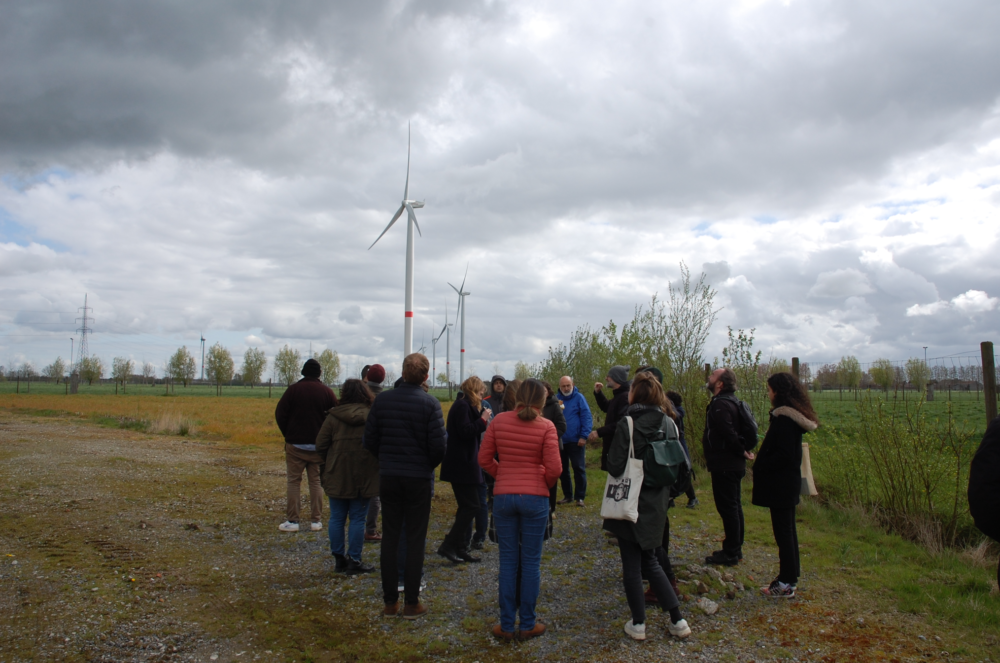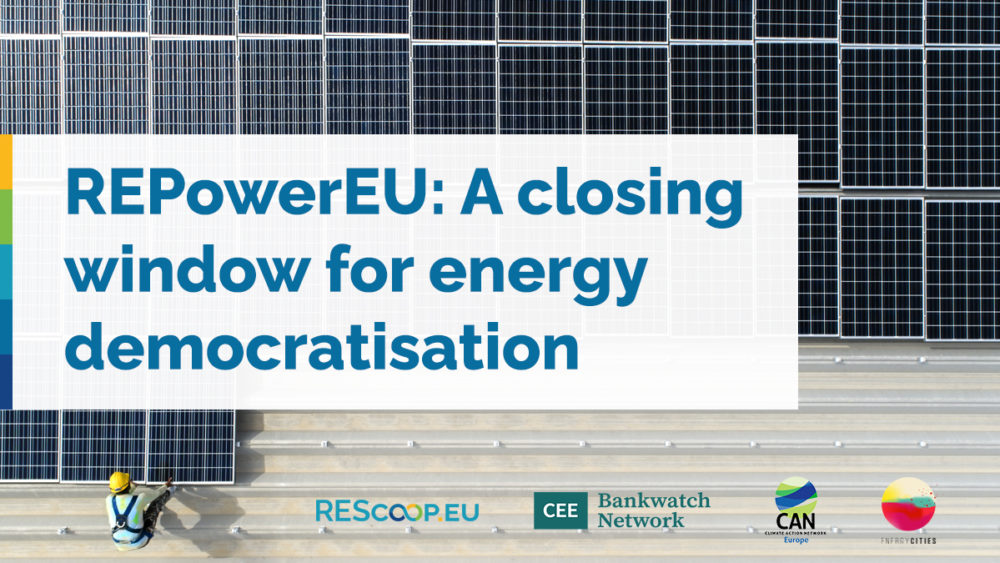
Brought to you by the Together for 100% Renewable Europe Campaign
Energy communities are a democratic solution to our pressing energy, poverty and social challenges. In response to the worsening fossil fuel crisis, more and more communities across Europe are establishing local energy communities to take control of how they produce and consume their own renewable energy in a sustainable and fair manner. By promoting local ownership and collaboration, energy communities enable the production and consumption of sustainable, affordable energy. Thereby addressing energy poverty and contributing to fighting the climate crisis by driving the renewable energy revolution while fostering fairness and inclusivity.
Belgium’s energy community pioneer
Back in April, during CAN Europe’s General Assembly, the renewables working group of the Network had the opportunity to visit the pioneering renewable energy community in Belgium. An energy cooperative called Ecopower was established in Flanders, Belgium in 1991 with the aim of putting sustainable energy in the hands of the citizens. They strive to achieve 100% renewable energy for electricity, heat and mobility. Ecopower unites citizens to invest together in renewable energy through direct participation as all shareholders are co-owners of the production installations. In addition, they raise awareness and inform their members about rational energy consumption.
What initially started as a handful of members has grown into a much larger regional cooperative with over 67,000 citizens coming together under Ecopower to produce local, sustainable energy. In 2022, the energy cooperative saved almost 61,000 tons of carbon emissions, while also having the lowest energy bills in Belgium in the midst of an energy prices crisis. There is a “one member, one vote” policy within the Ecopower cooperative to ensure that everyone has an equal say in the decision making process, irrespective of their socio-economic background.

So why is there not more?
Despite the economic, social and environmental benefits of energy communities, their growth across Europe has been quite slow. This is largely due to the number of hurdles communities face when trying to establish an energy community. Among the challenges, the lack of dedicated financial support is the most significant.
In terms of financing, and despite some positive examples in a handful of EU Member States, there is a scarcity of dedicated funding schemes for energy community development within both public and private funding mechanisms. Even in Member States, where there are funding schemes, those are often not tailored to the specific and sometimes diverse needs of energy communities.These communities typically face challenges such as limited technical and organisational capacity, insufficient startup capital, risk aversion, and a need for democratic and participatory governance. Public financing, in the form of grants, loans, or a combination of both, offers a compelling solution for energy communities. This type of funding can provide valuable support and resources to help these communities. By accessing public financing, energy communities can mitigate financial risks, access necessary capital, and propel their projects forward.
EU governments have a significant opportunity to harness public funds in support of energy communities, facilitating a faster renewable energy transition, fostering citizen inclusion, and cultivating broader acceptance of renewable energy sources. By strategically allocating public resources, governments can empower energy communities, enhance their capacity, and drive the shift towards a sustainable, inclusive, and just energy future. This approach not only strengthens community cooperation, resilience, and solidarity, but also paves the way for the widespread adoption of renewable energy across the EU. Through contributions from European Citizens in collective investment schemes combined with current renewable subsidy schemes, €224 billion could be mobilised to support community-based forms of res development.
A recent briefing produced between REScoop, CEE Bankwatch Network and CAN Europe looked at Leveraging European Public Funds to Support Energy Communities. It examined to what extent the three major types of EU Funds (Recovery and Resilience Fund, Cohesion & Regional Development Funds, Modernisation Fund), are being used by Member States to support energy communities. Overall, across the EU member states, few had used EU funds to set up dedicated financing schemes to support energy communities. Moreover, there were still many countries who have yet to finalise the transposition of the EU definitions for Renewable Energy Communities (REC) and Citizen Energy Communities (CEC). This could result in a missed opportunity to harness the large amounts available through the EU budget and Next Generation EU for investing in transformative projects that are citizen-led, community-owned and whose main purpose is to deliver social and environmental benefits.
National governments and managing authorities should learn from promising examples across the EU. For example, the Republic of Ireland’s Sustainable Energy Authority (SEAI) provides grant funding for setting up energy communities through a dedicated Energy Community Programme financed exclusively through national funding. Similarly, Spain’s Recovery and Resilience Plan has earmarked €100 million for energy communities within the component 7 of its recovery plan (“deployment and integration of renewable energies”). Finally, Czechia is harnessing the Modernisation Fund for investing in energy communities (KOMUENERG programme). For all their limitations, these indicative examples illustrate that setting up dedicated programmes for providing grants and loans to energy communities via EU funds and national public finance is both feasible and necessary.
Overall, a lack of financial support can hinder the significant potential that energy communities have in the wider renewable energy transition. These local energy initiatives can provide environmental and socioeconomic benefits including quality jobs, establishing local supply chains, promoting community development and lowering emissions. Energy communities are also key contributors to creating a just and fair energy transition by providing affordable energy to low-income households. As these communities operate on a not for profit basis, the revenue generated can be used to set up schemes to renovate the most vulnerable homes and alleviate energy poverty for those most in need.
Although a significant challenge, lack of finance is not the only barrier to the growth of energy communities within Europe. Regulatory barriers, limited technical support and expertise, lack of public awareness and education are among the issues that are hindering the expansion of these local energy initiatives.
What needs to be done?
Moving forward, several actions are needed on at least three fronts.
First, from a legal and regulatory perspective, Member States need to fully transpose the EU definitions of energy communities in order to update national policy frameworks that assist in the establishment and introduction of energy communities into the energy market. In tandem, a supportive regulatory framework is needed by simplifying administrative procedures, providing fair remuneration for community-generated energy, and grid access rights, while encouraging more citizens and communities to partake in these local energy initiatives.
Second, setting up dedicated financial schemes in all EU countries, providing multiple forms of finance (grants and loans) to energy communities, is necessary if we are to deliver a citizen-led energy transition at scale. At the moment, the funding mobilised is far from sufficient in the overwhelming majority of Member States, and we have proposed a series of concrete steps that governments and managing authorities could take to upscale the financing of energy communities notably via EU funds.
Third, more technical support is needed to enable the participation of citizens in energy communities while reducing the barriers of access to finance. Among other measures, setting up dedicated one-stop shops could assist energy communities in accessing existing funds as long as dedicated financial schemes are in place. More broadly, it is crucial for governments, policymakers, and stakeholders to recognize the importance of enabling frameworks and support schemes for energy communities. By establishing favourable policies, providing financial incentives, and offering technical support, countries can create an environment that encourages the growth and success of energy communities, accelerating the transition to a prosperous, sustainable, 100% renewable future.
Written by Seda Orhan, Renewable Energy Campaigner at CAN Europe, and Olivier Vardakoulias, Finance and Subsidies Policy Coordinator at CAN Europe

For further reading, check out this policy briefing that calls on countries to included dedicated budget lines for energy communities in their National Energy and Climate Plans.



